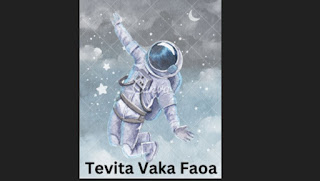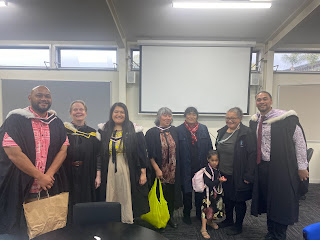 |
| English Department @ TOD 17/11/23 |
At our most recent Teacher Only Day (Friday November 17 - Week 6 Term 4) we prepared and planned our Senior NCEA Level 1 English course, our literacy strategy for 2024 and we started to review and refine our Junior English program. I have really enjoyed documenting and reflecting on our journey in preparing for our new NCEA Level 1 English course (see my reflections below)
Since we have covered so much since May 2022, TOD was an opportunity for us to look and review where we are at and refine our next steps so that we are as ready as we can be for 2024. Our main focus for the TOD was to look at:
- Literacy Strategies 2024
- Term 1 2024: Our Stories + Our Histories through poetry + AS 1.1: 91924
- Term 2 2024: Their Stories + Their Histories through film + AS 1.2: 91925
- Term 3 2024: Our Voices + AS 1.3: 91926
- Junior English Program 2024
In this post I will reflect on how our department planning went, the highlights and the learnings.
LITERACY STRATEGIES 2024
The Literacy Specifics for 2024 is going to be a huge focus for not just our department but across all learning areas. The idea is that we choose 2-3 Literacy Specific Skills to focus on (across the school) in our Year 9 and Year 10 programs and use effective literacy strategies to help support them. This is to help prepare our students for the Literacy Co-Requisite assessment that will be offered to all of our Year 10 students. I have written a reflection on this and what we were able to do with the teachers in getting them to think about the new co-requisites for both literacy and numeracy.
I have reflected on the trial group who sat the co-requisite and the work that we put in place to help prepare them.
I reintroduced the Literacy Specifics to the team and asked them to reflect on the following questions. The idea behind this was to see what they want to prioritize with the Literacy Specifics and then incorporate this into our planning for our Junior English Program. I asked them to think about the following questions in groups and then provide feedback.
Which literacy skills should we focus on in
Term 1:
Term 2:
Term 3:
Term 4:
Literacy Co-Requisite Test to take place:
May (Term 2)
September (Term 3)
What can we do to teach these literacy skills?
Here is the feedback from the team.
What literacy skills should we focus on?
Term 1 -
- Identify main idea
- Distinguish relevant information from irrelevant information
Term 2 -
- Locate facts or information
- Organize information
Term 3 -
- Recognize features of language and structures
- Select appropriate vocabular
Term 4 -
- Summarize information
- Compare and contrast texts
What can we do to teach these literacy skills?
- Focus on reading text together or in groups
- Different types of texts and different types of reading
- End of the week: get them to summarize what they’ve read for the week
- Make a generalize comment about the topic
- How can we making reading fun? Provide shorter texts
- Pose questions: Why do you think the author does this? What do you think the author’s attitude is?
- Effective Literacy Practice
- Effective Literacy Strategies
TERM 1 2024: OUR STORIES + OUR HISTORY THROUGH POETRY + AS 1.1: 91924
The focus for Term 1 is 'Our Stories and Our Histories: Window' looking into the stories and experiences of people in our country. The primary text for Term 1 is Tusiata Avia's poetry collection 'The Savage Colonizer Book'. The learning intention is to understand how the context and language from the text interact and connect. The assessment that we are going to bring in to support the learning is 1.1. We have spent time going through this assessment and in our session from TOD, we looked specifically at ONE text from 'The Savage Colonizer Book' and what we can do with our students with the text. We also looked at the assessment 1.1 (a basic structure) and what the opportunities are with this assessment.
Our plan for Term 1 is to:
- Teach the context around each text that we are going to cover (x3 poems from 'The Savage Colonizer Book')
- Teach the poem and look at the language that has been shaped within the context
- Complete a language study for each text
- Craft a research text (written or oral presentation) on ONE chosen text from the 3 texts that we studied in class that links to 1.1.
TERM 2 2024: THEIR STORIES + THEIR HISTORIES THROUGH FILM + AS 1.2: 91925
The focus for Term 2 is 'Their Stories and Their Histories: Window' looking into the stories and experiences of people in our country. The primary text for Term 2 is the New Zealand film 'The Dark Horse'. The learning intention is understanding certain aspects of texts and why it is used to create meaning. The assessment that we are going to bring in to support the learning is 1.2. We also looked at the assessment 1.2 (a basic structure).
Our plan for Term 2 is to:
- Focus on our primary text - The Dark Horse
- Complete a film study looking at specific aspects of the text (film techniques) specifically techniques like characterization, symbolism, motif, dialogue and costume
- Complete a Close Viewing assessment for the film which links to 1.2.
TERM 3 2024: OUR VOICES + AS 1.3: 91926
We spent some time going through the Term 3 program - 'Our Voices' - the main focus for this is the external which will take place at the end of Term 3. Our English NIF (NCEA Implementation Facilitator - Alex Moffat -Wood) joined us and went through the assessment with us. The students will write one piece of writing (either fiction or nonfiction) they also have to write a statement of intent, brainstorm to be included.
We will get the writing prompts at the beginning of Term 3 and the students will work on the assessment half way through the term. It is important to note that throughout the year, we will provide opportunities for the students to write (for enjoyment and to prepare for 1.3) so that they can decide on a style of writing that they want to focus on for the external. The prompts come with a visual and a list of options that the students can write from.
Our plan for Term 3 is to:
- Provide opportunities for the students to write in different text types throughout the year (non fiction, fiction, argumentative, blog writing etc)
- Go through the prompts with the students and give them an opportunity to plan for each prompt.
- Block out a part of the term so that the students can focus on crafting their text (maybe from Week 5 onwards).
JUNIOR ENGLISH PROGRAM 2024
We will be redesigning our Junior English program to align with our new NCEA Level 1 English program. The program will feature an intensive approach to our new literacy specifics and we will also mirror the same type of assessments that we offer in Level 1 English for our Year 9 and Year 10 English students.
I really enjoyed our time together. It is always good to come together and get on the same page. Especially at a time where there is a lot of change, it is imperative that we understand what the goal is and how we are going to get there. I understand that it is important to have room to learn and grow (and fail). I am looking forward to putting all of our preparation and planning into action next year.
























